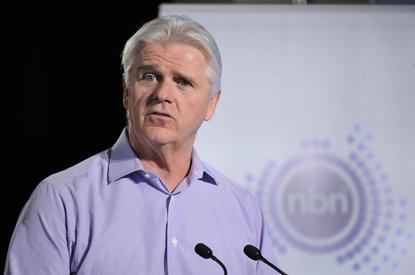NBN Co almost doubles revenue
- 16 August, 2018 13:23

NBN Co CEO Bill Morrow
NBN Co, the company behind the roll out of the National Broadband Network (NBN), has posted $1.98 billion in revenue, a 98 per cent increase compared to the previous year results.
The average revenue per user (ARPU) went up from $43 to $44 in the 2018 financial year, which was the main factor helping the company to almost double its revenue.
The drivers of ARPU consist of both active end-user activity – determined by consumption volume – and price, which is pegged to speed rate.
According to the company's results, there are currently more than four million active premises in Australia, a 65 per cent increase compared to the previous reporting year - there are seven million premises ready to be connected and 8.1 million ready for service.
NBN Co CEO Bill Morrow said that 75 per cent of the construction was now finished.
“We’re demonstrating continued progress against our goal to complete the build by 2020," Morrow said. "Today, we have 4.2 million activations on a network that is 75 per cent built and with 99 per cent of premises in design, construction or complete.”
By 30 June 2017, $299 million in revenue was coming from connectivity virtual circuit or network-to-network interface (CVC/NNI), by 20 June 2018 a total $618 million in revenue was being generating from CVC/NNI, the highest revenue generator at the time.
"We know that there is more to do but we are getting our portion of the connected experience right with greater frequency," Morrow said.
"All of our key technologies and the multi technologies mix have now been launched. This financial year we introduced the FTTC to the footprint we started with a limited release of premises on launch and now we have more than 70,000 ready to connect."
Addressing questionings on why NBN Co did not offer ultra-fast speed straight away, Morrow said that NBN Co does not see immediate demand for the service.
"NBN Co is a wholesale operator and we want to offer products that retailers will sell to the end users," he said.
"And while ultra-fast speeds would be great to have on offer we simply do not see the demand for this services to justify the resources required to make them commercially available at least right now."
Morrow said that a way to illustrate this was end user premises on a gigabit per second speed tier makes up just 150 premises out of the four million currently using the network and NBN Co decided to invest its resources into "completing the roll out and improve customer experience".
In the 2017 financial year, NBN Co had a 138 per cent year-on-year surge in total revenue to just over $1 billion – more than double the $421 million it collected in the same period last year.
This increase appeared to be largely driven by a substantial rise in uptake of the network as the rollout itself picks up pace.
Premises activated, as of the end of June 2017, for example, came to 2.44 million, up from the previous year’s tally of 1.1 million, while premises ready for service at the end of the financial year came to 5.71 million, well in excess of the 2.9 million in FY16.
In contrast, the NBN roll out is creating challenges in the market for Telstra, having an impact on its earning and net profit for FY19.
Telstra said it had absorbed about $1.4 billion of the annual approximate $3 billion recurring EBITDA impact of the NBN and this was reflected in the decline of 34.6 per cent in Fixed EBITDA (excluding NBN cost to connect).
Senate inquiry
On 15 August, during a Senate inquiry into the National Broadband Network rollout in regional areas, NBN Co chief financial officer Stephen Rue said that the company had completed a consultation with RSPs and would begin offering the new fixed wireless products from 20 August.
“We listened to feedback throughout the consultation and have kept the bundled price of the 50 megabits per second product at $45 for existing users,” the CFO said.
“These new wholesale bundled discounts will provide RSPs with added flexibility and choice to package and price their retail plans for homes and businesses”
For new users the 50/20Mbps bundled fixed wireless product will have a wholesale price of $65 a month (including 2Mbps of capacity).
NBN Co’s fixed line 50/20Mbps bundled product costs $45 a month (its 100/40Mbps bundled product costs $65 a month).
Shadow communications minister Michelle Rowland took aim at the news saying this was an extra $20 per month regional consumers will have to fork out.
"Simply put, a regional customer could pay 44 per cent more than someone in the city for the same 50 Mbps speed under this plan," Rowlland said.
“This is a very troubling development. The NBN was supposed to bridge the digital divide – not create a new one,” she added.
Since then, the office of Senator Mitch Fifield issued a statement that NBN Co was not planning to charge more for fixed wireless services compared to fixed services.
"NBN is embarking on a fresh round of product consultations but have made no decisions," he added. "NBN offers equivalent pricing on comparable fixed line and fixed wireless products. The Government will ensure that this continues."

